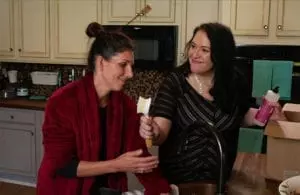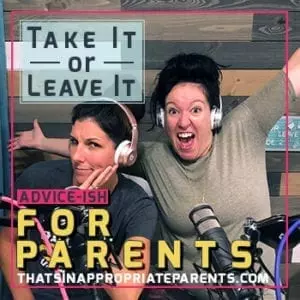Welcome to Take It or Leave It, an advice-ish podcast for parents brought to you by Grove Collaborative.
Take it or Leave it is brought to you by Grove Collaborative. Visit http://grove.co/takeit and grab your “Free” gift with order.

Grove Collaborative – Cleaning with a “Friend”
Mike Julianelle of Dad and Buried
Holly Frazier is an actress, known for Todrick Hall: Freaks Like Me (2014), The Bold and the Beautiful (1987) and Dance Moms (2011). She has been married to Evan Frazier Sr since 1996. They have three children.
Dr. Holly Hatcher-Frazier is a member of Lifetime’s hit reality show, Dance Moms. Inspired by her own childhood dance experiences, Dr. Holly enrolled her daughter Nia in the Abby Lee Dance Studio to foster Nia’s love for the performing arts.
Having worked as an educator for nearly 20 years, Dr. Holly served as the Director of Admissions at the Ellis School in Pittsburgh, Pa., and later accepted the position as principal of the Winchester Thurston School in Pittsburgh. A consummate professional, Dr. Holly often received criticism on Dance Moms related to her desire to maintain her career, while supporting Nia’s dance aspirations. She made the tough decision to resign from her duties as principal to embrace motherhood as a full-time job.
A passionate scholar and advocate for education, Dr. Holly plans to continue her career as an educational consultant and motivational speaker – affording her the flexibility required to remain “hands-on” throughout Nia’s career. She hopes to use her celebrity platform to speak on issues related to education, motherhood, and the workplace; and how women can effectively strike the right balance in all aspects of life.
Dr. Holly is a Fulbright Scholar, and holds a Bachelor’s Degree in History and American Studies from Williams College and a Master’s in Educational Leadership from the H. John Heinz III School of Public Policy and Management, Carnegie Mellon University. She currently resides in Pittsburgh, Pa. and enjoys reading, traveling, and spending time with her husband, Evan, and their three children – Evan, Jr.; Nia; and William.
In Trending News – Weight Watchers eyes a new clientele: Children
Section Intro
Do your homework! Clean your room! Count your Weight Watchers points?
Weight Watchers, which now calls itself WW, this week introduced a new app called Kurbo by WW to “help kids and teens ages 8-17 reach a healthier weight.” WW last year acquired Kurbo, a digital health start-up whose system is based on Stanford University’s pediatric obesity program.
Adolescents track their food in Kurbo’s free app. A green, yellow, or red light grades what and how much of a food they eat. They can also consult with a digital coach for a fee, starting at $69 per month.
Section Notes
“This is a scientifically proven way to get kids to eat healthier and move more, so we’re excited to get it into as many hands as possible,” WW’s Chief Scientific Officer Gary Foster told CNBC.
Some WW loyalists applaud the move, saying the company has transformed their lives and hope it can transform children’s lives, too. But nutritionists worry Kurbo promotes an unhealthy relationship with food during an especially impressionable time.
“I really do appreciate the idea that parents are signing up their children in ways that are largely well-intended, but what we know is that preoccupation with food and righteousness around food does not create healthy relationships with food,” said Anna Sweeney, dietitian and owner of Whole Life Nutrition Counseling in Concord, Massachusetts. “It does not leave people feeling good or competent in eating.”
When you sign up for Kurbo, you enter your name, height, weight and gender. You then choose a goal: eat healthier, lose weight, make parents happy, get stronger and fitter, have more energy, boost my confidence or feel better in my clothes.
Abby Langer, a dietitian who owns her own practice in Toronto, Canada, said she wanted to “barf” when she heard “make parents happy” was an option. Foster said Kurbo is meant to be a “family-based approach” and that parents should not single out one child. Instead, he said parents need to set the example and involve the entire family.
“Kids who are overweight know they’re overweight and already feel bad about it,” Langer said. “Giving this app to a kid is like saying there’s something wrong with you.”
Once you select a goal, you rank how important the goal is to you on a scale of 0 “not important” to ten “super important” and how confident you are that you can reach your goal from 0 “not confident” to to “super confident.”
Your profile page charts your body mass index (BMI), a formula based on your weight and height. You can check how many green, yellow and red foods you’ve eaten during the week. While it’s not quite counting points, it’s not that far from it.
Foster dismisses the idea that Kurbo is a diet, which he defines as a program like keto or paleo that labels certain foods as bad and encourages people to avoid them. Diets, he said, lead to short-term behavior change, whereas WW focuses on establishing healthy patterns.
Linda Tucker, a food and body image coach, thinks the light system is “problematic” because it “loses nuance.” She understands the intention to make it simple. Kurbo’s program does not require kids to track calories or fat, but “they’re still saying these foods are better than these foods without any context.”
“It’s not realistic, and it’s not a healthy way to teach anyone about food, especially children,” said Tucker, who owns her own practice in Portland, Oregon.
Helping or hurting
Some WW members praised the company for introducing a program to help children and teens.
About 13.7 million of U.S. children and adolescents — or nearly one-fifth — are obese, according to the Centers for Disease Control and Prevention. The CDC defines obesity as a BMI at or above the 95th percentile for a child’s gender and age group. A ten-year-old boy who weighs 102 pounds at 4 feet 8 inches tall would be considered obese.
Even that is controversial, with some health professionals arguing that BMI is an arbitrary and inaccurate measurement. However, people who are considered obese face a higher risk for health conditions like high blood pressure and Type 2 diabetes, according to the CDC.
“The reality is, the data are very clear that we have a science-based solution to help kids who are struggling with overweight and obesity, and we can do it very well with our digital app,” Foster said.

FabFitFun Seasonal Subscription Box Discount Code
Parenting Crap – Are We Doing Enough to Prevent Bullying in Schools?
Section Intro
There’s no federal law against bullying, but most states and school districts have policies against aggressive behavior. Should we be doing more to combat bullying in schools?
Section Notes
About 20% of students—or one in five adolescents—report being bullied in school. Bullying comes in many different forms, ranging from physical assaults to verbal threats to online name-calling. And no matter what form the bullying takes, it can leave the victim feeling threatened and unsafe.
“What we often hear from students is that bullying hurts, whether it’s done in person or through technology, and that the end result is damaging,” says Bailey Huston, coordinator at PACER’s National Bullying Prevention Center. In fact, bullying is associated with emotional distress, anxiety, depression, school violence, and school avoidance. It might also be a factor in someone’s decision to commit suicide.
Bullying usually takes place on school grounds—often in the hallways, classrooms, cafeteria, or bathrooms. This makes it difficult for victimized children to feel safe away from home. And while school administrators have the authority to intervene if a student feels threatened at school, aggressive behavior is often overlooked. This raises an important question: Are we doing enough to prevent bullying in schools?
Federal Bullying Laws
There’s currently no federal law against bullying, and it’s not considered a criminal offense in most states. But bullying sometimes overlaps with discriminatory harassment, especially if it’s based on a student’s race, national origin, color, sex, age, disability, or religion, according to PACER’s. Bullying also violates civil rights acts if it interferes with someone’s right to free appropriate public education (FAPE). In these cases, federal law requires publicly-funded schools to handle the situation appropriately.
hillLocal school districts are required to implement policies against bullying. You’ll find guidelines in the school handbook or through administration.
Cities across the country are also proposing their own regulations to combat aggressive behavior in schools. Take, for example, the Wisconsin Rapids Public Schools District in Wisconsin. It recently proposed a bill that would require parents of bullies to pay up to $313 in fines. The bill came into existence after student-written notes urging a seventh grader to kill herself were posted online, according to a New York Times article from June 2019.
Always contact your school board if you feel their policies are ineffective or insufficient. If a school has not been responsive and you feel your child’s education is being undermined bullying, file a complaint with the Office for Civil Rights.

Grove Collaborative – Cleaning with a “Friend”
In Love and Marriage – Why My Children Will Always Come Second to My Marriage (Is this possible? Do you put your spouse first?)
Section Intro
Ayesha Curry, mom of three and wife of Golden State Warriors star player Stephen Curry, made headlines when she told HelloGiggles.com that the secret to her successful marriage “is just making sure that we put each other first, even before the kids, as tough as that sounds.” I took comfort in knowing that there was another couple (a young couple, at that) validating my decision to put my husband first. But her comment sparked some serious debate on social media about whether putting your significant other before your little ones makes you a bad parent
Section Notes
Relationship and family experts will tell you it doesn’t. And it’s not such a bad idea to pay a little extra attention to your spouse, especially since “multiple researchers have shown a precipitous drop in the level of marital satisfaction in the first three years of a new baby,” says Liz Colizza, a licensed professional counselor and head of research at Lasting, a relationship counseling app. In fact, 67 percent of all couples experience a drop, while only 33 percent maintain their level of satisfaction, according to research published in the Journal of Family Psychology.
Financial worries, lack of sleep, postpartum depression, and sometimes even jealousy over the baby’s attention are all common factors that contribute to a rocky relationship for new parents. But the bond between them is critical, and the marital health of parents can affect kids. Colizza, who is based in Saint Louis, Missouri, explains, “the single largest factor in determining a child’s social, emotional, and cognitive development is the emotional connection between the pare And while it might seem counterintuitive to prioritize your spouse when you have children, you will inadvertently also be teaching them a valuable lesson. “You are [your child’s] biggest example and modeling how to take care of yourself is one of the best ways you can encourage them to develop great skills of self-care as well,” says Alisha Powell, a licensed clinical social worker and therapist in Atlanta, Georgia.
But I’m not saying prioritizing a marriage gives parents the permission to neglect their kids—it’s not about that. You are (and always will be) responsible for the well-being of your child. The goal here is to preserve your mental health, maintain a healthy romantic relationship, and not lose sense of the reason you and your spouse got together in the first place. When mom and dad are happy, the children will be, too. That’s why Jerry and I have vowed to keep up with regular date nights and try to continue taking our annual wedding anniversary trips (even if it’s just an overnight staycation). Plus, this gives the kids an opportunity to spend some quality time with their grandparents—they’re already calling babysitting dibs anyway.

















